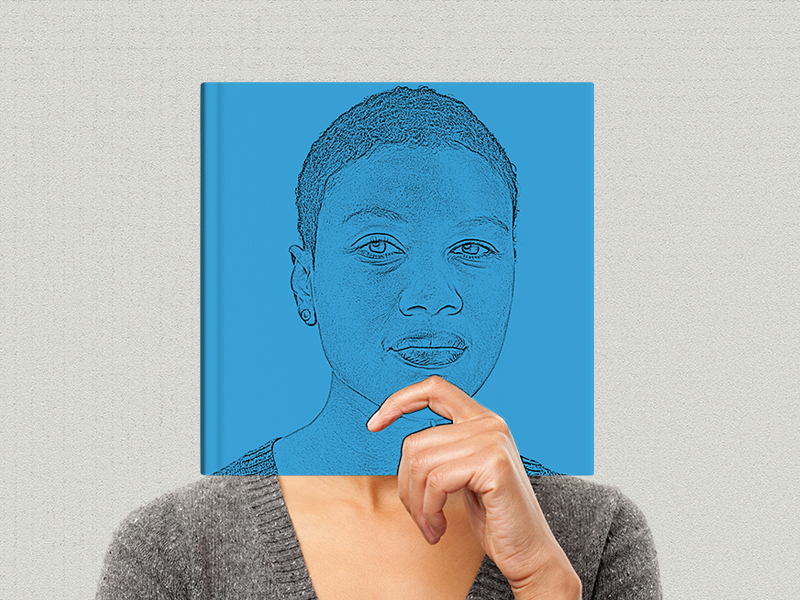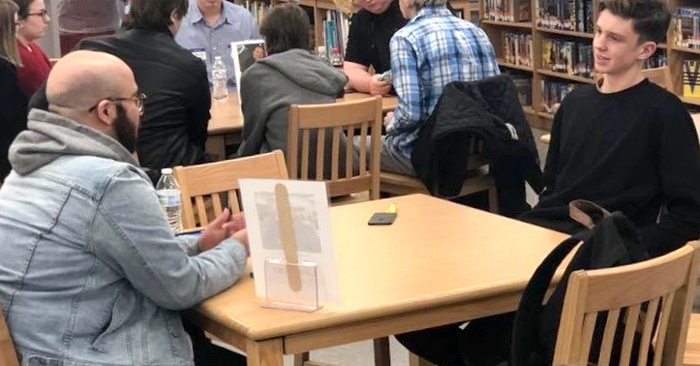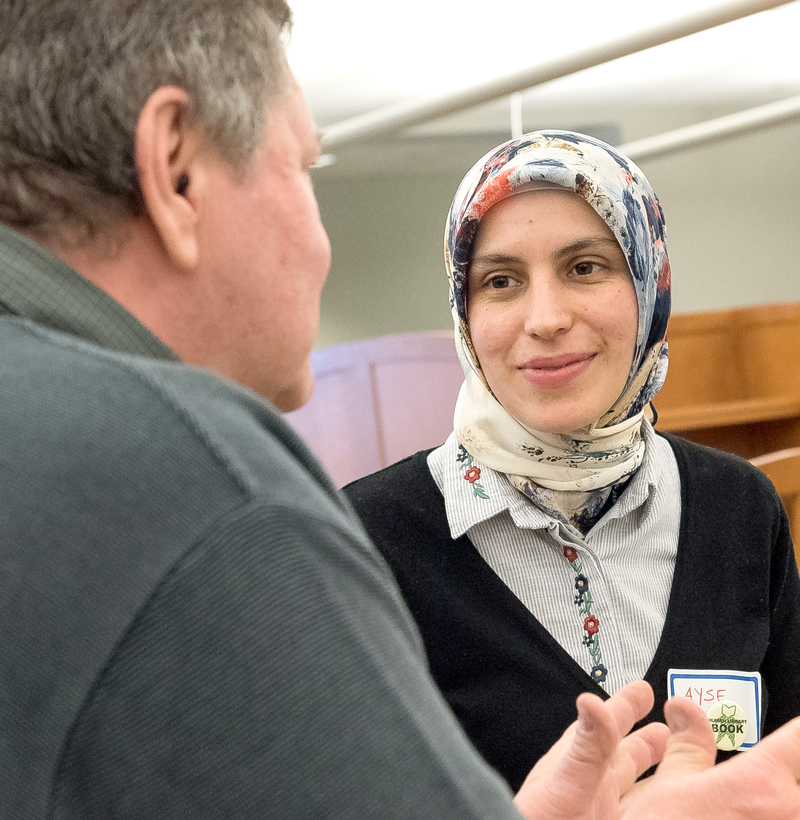When the Books Are People: How the Human Library Targets Bias
More U.S. librarians are using this interactive programming model, in which human "books" speak with patrons about their life experiences.
 |
Getty Images photos by drbimages (person), dmitriymoroz (book). SLJ photo composition. |
“Unjudge someone.” That’s the motto of the Copenhagen-based Human Library Organization (HLO), marking its 20th anniversary in 2020.
Billed as an “innovative and hands-on learning program,” HLO designs events that invoke the library model by encouraging visitors to “check out” human “books”—i.e., speak with guests, who often belong to a stigmatized or marginalized group, about their experience. The idea is to encourage thoughtful conversation and reduce stereotyping and bias.
More U.S. librarians are embracing Human Library activities, too, with some adapting events for school and all-ages public library programming. Some expand the HLO parameters to invite guests with a wide range of personal and professional experiences of interest to young people. Successful events require strong planning skills and guidelines. Here’s what some U.S. librarians have done.
Best Practices, GuidelinesFind a format that works for your setting. The HLO model involves a “checkout desk” to “check out a [human] book” for a 30-minute conversation. Such staged dialogue stations are most common, but Mitchell altered the format to fit into a classroom visit approach. Consider noise levels and other factors that may present distractions. Use personal networks and community organizations to find volunteers. “We asked our whole staff to think about who they knew that had experienced prejudice or discrimination based on their identity,” says Lee. Now, she “receives word-of-mouth recruiting.” Prep guests ahead of an event. Rand and a colleague interview potential visitors to make sure everyone feels comfortable. Mitchell offers storytelling coaching and tools, such as story maps, and shows new guests videos of previous events so they can see how others have told their stories. When selecting guests, consider the “windows and mirrors” philosophy introduced by Rudine Sims Bishop. Lee asks students to think about visiting with a person similar to them (a mirror) and someone with a new viewpoint or experience (a window). Prep students. Lee uses tools from the Right Question Institute to help them generate inquiries. Debrief. What changed in the student’s perspectives? Guests can fill out evaluation forms and provide feedback for future events. |
Dreaming up a program
As director of the Taylor County (KY) Public Library (TCPL), Andrea Lawler was looking for ways to reach out to the community with more engaging programming. As she talked with staff, the idea of “people as books” came up—inviting guests with diverse backgrounds and lives to speak with youth.
“Our reason for wanting to do it was to expose students from our small, rural Kentucky town to [people with different experiences],” says Lawler, who hadn’t heard of HLO.
After Lawler took a new job nearby as a school librarian at Taylor County High School, her principal encouraged her to pursue the idea. Lawler collaborated with TCPL youth outreach librarian Dalton Bennett to host her first iteration of a Human Library event at her school.
Lawler and Bennett sought community volunteers, and kids signed up for conversation sessions. Some of the guests discussed their experiences living with homelessness, grappling with addiction, identifying as LGBTQ+, living with a disability, and choosing celibacy. “I wanted to model for students how we can be different or have different opinions and ideas and still have a healthy, adult conversation,” says Lawler.
Feedback was so positive that they immediately began planning another session. While researching, Lawler came across the HLO website and sent an enthusiastic email about her event. She then had a phone conversation with HLO co-founder Ronni Abergel.
“He knew my intentions were good,” says Lawler. “But moving forward, Abergel stressed the need to carefully consider all elements of a Human Library program to ensure the safety of volunteers and participants.” The organization provides guidelines for sound programming to those that register with HLO, a trademarked name.
Now at a Campbellsville High School, Lawler has an HLO license and uses the organization’s resources. “Imagine changing one student’s views,” she says. “This is why I do these events.”
 |
A guest and a student engage during a Human Library event at the Taylor County (KY) High School media center.Photo by Andrea Lawler |
Enhancing a school’s mission
Cassy Lee’s school is in its second year of an equity, diversity, and inclusion strategic plan, and Lee, the learning center coordinator at the K–8th grade Chinese American International School (CAIS) in San Francisco, says that Human Library events are a strong fit.
“Our school is a Chinese immersion program, so most of our students are Asian or bicultural. Most are relatively affluent, so we wanted to present new life experiences to them,” says Lee, also SLJ’s 2018 Champion of Student Voice.
Lee registered with HLO and finds the organization’s materials incredibly beneficial. “Our guests are people of color, people on the gender spectrum, neurodiverse people, people who have experienced addiction and homelessness,” Lee says.
“We have an identity unit built into our school’s advisory period curriculum,” Lee adds. That unit “provides [students]with language to successfully navigate a dialogue.”
To find volunteers for her first event, “I reached out to my personal contacts, an LBGTQ speakers’ bureau, [and] the mayor’s disability council, and emailed area social services agencies,” Lee says. She has called on many of them for subsequent visits.
Lee’s programs are half-day, whole-school events. Students receive information about the visitors ahead of time, then list their top four choices, and Lee then matches students with two visitors. While students are encouraged to consider questions in advance, Lee tries to avoid pre-written queries that may be based on biases or incomplete information. She uses materials from HLO to prep the guests, letting them know that they are free to set boundaries or not answer questions they don’t want to.
“We want to ensure that this isn’t just a presentation of the [visitor’s] life. We are looking for real dialogue with our students,” she says. Lee stations a teacher in each classroom to intervene “in case of anything inappropriate.” She also provides student ambassadors to attend to visitors’ needs.
Two of her students found volunteers for her school’s January event by direct messaging people they follow on Instagram. One guest is a formerly homeless student now enrolled at the University of California, Berkeley, and another is an Obama Foundation Fellow. In addition, two CAIS graduates are organizing Human Library events at their high schools. “I love seeing students take ideas and run, empowered to make things happen on their own,” Lee says.
Improving the format
After reading a post about HLO in 2016, an English teacher at Eureka City (CA) Schools suggested the idea to school librarian Ruth Mitchell. “I was an immediate ‘yes!’” Mitchell says.
She applied for and received a license from HLO, and her first event took place over two days in the school library. Students chose who they wanted to speak with without much guidance. Volunteers and students got “maxed out” with conversation, Mitchell says, and “some students were not mature enough. We needed to provide more structure.”
Now, guest speakers take their place in a classroom circle with students and teachers. “We sit in a circle where we know the expectations for respectful conversation,” says Mitchell. She records as many sessions as she can and hopes to post an archive on the school website.
Mitchell also works with teachers to connect the activity to their curricula. For example, a volunteer who has survived a genocidal event would be invited in connection to a world history class, and immigrants who are English language learners come to speak with language arts classes.
Before the visits, “We help [visitors] feel comfortable and reassured by connecting with them over the phone and answering any questions,” says Mitchell. A student ambassador assists them throughout their visit. Standout visitors have included Betty Chinn, whose Chinese family was persecuted during Mao Zedong’s Cultural Revolution. Chinn, featured in the book Girl Activist (Downtown Bookworks, 2019) by Louisa Kamps and coauthors, has dedicated her life in the United States to working with Eureka’s homeless population. Another eye-opening experience for students came from a black police officer working at Humboldt State University who shared his ongoing experiences of racism. Other guests have included armed forces veterans, a centenarian who attended the school when she was young, public defenders, and farmers.
 |
Participants chat at the Evanston (IL) Public Library.Photo by Lynn Troutman (courtesy of Evanston Public Library) |
All-ages public library events
Evanston (IL) Public Library (EPL) has run four all-ages Human Library programs in the past two years, according to Julie Rand, lifelong learning and literacy librarian. “Our job as librarians is to offer learning opportunities to everyone,” she says, and whole families attend events. While EPL doesn’t specifically market the Human Library to teens, staff encourages them to attend, which they do.
EPL’s guests have included a female rabbi and a drag queen. “We’ve avoided groups such as undocumented immigrants because we didn’t want to endanger them,” Rand says, adding that patrons have contacted the library about being HLO guests.
Bobby Overman, librarian with the Monroe County (IN) Public Library, has also led all-ages HLO events for two years after hearing about the idea in a TED Talk.
“Our library’s mission and vision statements include equity, diversity, and inclusion language, so we align these events with our strategic plan,” she says. In the first year, Overman saw a strong representation of teenagers, then younger kids in the second year. Overman strongly recommends holding these events in an open space, not “tucked back in a meeting room,” to provide more visibility.
While Rand and Overman both work with HLO, “I didn’t follow every single [guideline],” says Overman. Though she doesn’t hold pre-event training with volunteers, “we ask our ‘books’ to come up with three starter questions for visitors if the conversation needs an ice-breaker,” she says.
A student reporter from Indiana University once asked Overman why she presented this program in their “relatively liberal” area. People have prejudices, regardless of where they live, she replied.
“Even if you consider yourself liberal, you don’t know everything about someone’s story,” she adds. “You may think you know what it means to be bipolar, or homeless, or an immigrant, but until you get into conversation, you won’t know that every story is different.”
April Witteveen is a community librarian at Deschutes Public Library in Bend, OR.
RELATED
The job outlook in 2030: Librarians will be in demand
The job outlook in 2030: Librarians will be in demand
ALREADY A SUBSCRIBER? LOG IN
We are currently offering this content for free. Sign up now to activate your personal profile, where you can save articles for future viewing






Add Comment :-
Be the first reader to comment.
Comment Policy:
Comment should not be empty !!!